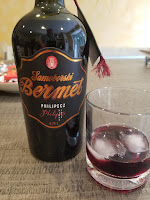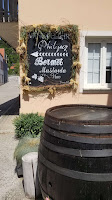
In 1812, when America was fighting its second war against Great Britain, Napoleon's troops occupied parts of the Austrian Empire including the Plešivica region and the town of Samobor, a free royal town since 1242 as established by King Béla IV. Whether the troops introduced "moustard" to the region or provided its name, Samobor is known for their
Muštarda -- a sweet and spicy sauce made from local mustard seeds and sweet grape must.

The troops most likely also sampled
Bermet, a local aromatized wine made with a specific sweet-bitter taste. This beverage was first concocted by physicians for medicinal purposes as indicated by a 1755 document from the manual of pharmacists of the Samobor Franciscan monastery. It was soon adopted by multiple Noble families as an aperitif. Since Samobor was a trading center located at the crossroads of the Austrian Empire, these recipes included various Mediterranean fruits and herbs, such as wormwood, carob, dried figs, candied sugar, and nutmeg.

Because of Bermet's historic production in Samobor and the desire to protect and promote that tradition, on "March 22, 2017, the Croatian Ministry of Agriculture approved the product specification for the existing geographical indication of aromatized wine products: 'Samoborski bermet', making it the only protected aromatized wine product in the Republic of Croatia". In 2020, the
European Union extended this designation throughout Europe under the geographic quality schemes -- which "establish intellectual property rights for specific products, whose qualities are specifically linked to the area of production". These are systems similar to the national appellation systems used for wine throughout Europe.

Members of the
Filipec family have been making Bernet and Muštarda since at least 1812. The Filipecs were leather makers with the tannery located steps from Samobor's main square. However, in 1946, the tannery was confiscated from Josip Joca Filipec, who in need of a livelihood, started producing Bermet and Muštarda commercially. Upon his death, he distributed the Bermet production to his eldest son Vojko and the Muštarda production to his youngest son Antun Dubravko.

In 1999 grandson Antun officially opened
Podrumi Philipecz after renovating the old tannery discovering an old well and forced to work with the sloping floors of the former factory. Antun also augmented into producing more traditional still and sparkling wines -- some produced partially using a wooden press built in 1864. These include delicious Grasevina, Pinot Sivi (Pinot Gris), a Rose Tia, and Cuvee Roko.
Returning to Bermet, Antun uses a
Frankovka (Blaufranish) and
Blauer Portugieser (both grown on the nearby Samobor Mountains) as a base then blends in the proprietary ingredients (certainly wormwood, carob, oranges, and dried figs) and aging six months in oak. The current version (18%) starts with an herbaceous aroma and then moves between sweet and bitter with both the wine and bitterness alternating taking center stage.

During our visit, Antun showed us how Bermet ages, even after opening as the herbs act as a preservative. The 2009 shows less bitterness but richer figs and orange with a mint aroma. The 2006 is more bitter as the wormwood dominates. Finally, the 1992 retains a remarkable freshness with a strong aroma of various fruits and herbs and just a hint of bitterness. I purchased a bottle in hopes of witnessing the wine develop over the next couple of decades. And every year post an updated tasting note. Cheers.
 In 1812, when America was fighting its second war against Great Britain, Napoleon's troops occupied parts of the Austrian Empire including the Plešivica region and the town of Samobor, a free royal town since 1242 as established by King Béla IV. Whether the troops introduced "moustard" to the region or provided its name, Samobor is known for their Muštarda -- a sweet and spicy sauce made from local mustard seeds and sweet grape must.
In 1812, when America was fighting its second war against Great Britain, Napoleon's troops occupied parts of the Austrian Empire including the Plešivica region and the town of Samobor, a free royal town since 1242 as established by King Béla IV. Whether the troops introduced "moustard" to the region or provided its name, Samobor is known for their Muštarda -- a sweet and spicy sauce made from local mustard seeds and sweet grape must.  The troops most likely also sampled Bermet, a local aromatized wine made with a specific sweet-bitter taste. This beverage was first concocted by physicians for medicinal purposes as indicated by a 1755 document from the manual of pharmacists of the Samobor Franciscan monastery. It was soon adopted by multiple Noble families as an aperitif. Since Samobor was a trading center located at the crossroads of the Austrian Empire, these recipes included various Mediterranean fruits and herbs, such as wormwood, carob, dried figs, candied sugar, and nutmeg.
The troops most likely also sampled Bermet, a local aromatized wine made with a specific sweet-bitter taste. This beverage was first concocted by physicians for medicinal purposes as indicated by a 1755 document from the manual of pharmacists of the Samobor Franciscan monastery. It was soon adopted by multiple Noble families as an aperitif. Since Samobor was a trading center located at the crossroads of the Austrian Empire, these recipes included various Mediterranean fruits and herbs, such as wormwood, carob, dried figs, candied sugar, and nutmeg.  Because of Bermet's historic production in Samobor and the desire to protect and promote that tradition, on "March 22, 2017, the Croatian Ministry of Agriculture approved the product specification for the existing geographical indication of aromatized wine products: 'Samoborski bermet', making it the only protected aromatized wine product in the Republic of Croatia". In 2020, the European Union extended this designation throughout Europe under the geographic quality schemes -- which "establish intellectual property rights for specific products, whose qualities are specifically linked to the area of production". These are systems similar to the national appellation systems used for wine throughout Europe.
Because of Bermet's historic production in Samobor and the desire to protect and promote that tradition, on "March 22, 2017, the Croatian Ministry of Agriculture approved the product specification for the existing geographical indication of aromatized wine products: 'Samoborski bermet', making it the only protected aromatized wine product in the Republic of Croatia". In 2020, the European Union extended this designation throughout Europe under the geographic quality schemes -- which "establish intellectual property rights for specific products, whose qualities are specifically linked to the area of production". These are systems similar to the national appellation systems used for wine throughout Europe. Members of the Filipec family have been making Bernet and Muštarda since at least 1812. The Filipecs were leather makers with the tannery located steps from Samobor's main square. However, in 1946, the tannery was confiscated from Josip Joca Filipec, who in need of a livelihood, started producing Bermet and Muštarda commercially. Upon his death, he distributed the Bermet production to his eldest son Vojko and the Muštarda production to his youngest son Antun Dubravko.
Members of the Filipec family have been making Bernet and Muštarda since at least 1812. The Filipecs were leather makers with the tannery located steps from Samobor's main square. However, in 1946, the tannery was confiscated from Josip Joca Filipec, who in need of a livelihood, started producing Bermet and Muštarda commercially. Upon his death, he distributed the Bermet production to his eldest son Vojko and the Muštarda production to his youngest son Antun Dubravko.  In 1999 grandson Antun officially opened Podrumi Philipecz after renovating the old tannery discovering an old well and forced to work with the sloping floors of the former factory. Antun also augmented into producing more traditional still and sparkling wines -- some produced partially using a wooden press built in 1864. These include delicious Grasevina, Pinot Sivi (Pinot Gris), a Rose Tia, and Cuvee Roko. Returning to Bermet, Antun uses a Frankovka (Blaufranish) and Blauer Portugieser (both grown on the nearby Samobor Mountains) as a base then blends in the proprietary ingredients (certainly wormwood, carob, oranges, and dried figs) and aging six months in oak. The current version (18%) starts with an herbaceous aroma and then moves between sweet and bitter with both the wine and bitterness alternating taking center stage.
In 1999 grandson Antun officially opened Podrumi Philipecz after renovating the old tannery discovering an old well and forced to work with the sloping floors of the former factory. Antun also augmented into producing more traditional still and sparkling wines -- some produced partially using a wooden press built in 1864. These include delicious Grasevina, Pinot Sivi (Pinot Gris), a Rose Tia, and Cuvee Roko. Returning to Bermet, Antun uses a Frankovka (Blaufranish) and Blauer Portugieser (both grown on the nearby Samobor Mountains) as a base then blends in the proprietary ingredients (certainly wormwood, carob, oranges, and dried figs) and aging six months in oak. The current version (18%) starts with an herbaceous aroma and then moves between sweet and bitter with both the wine and bitterness alternating taking center stage.  During our visit, Antun showed us how Bermet ages, even after opening as the herbs act as a preservative. The 2009 shows less bitterness but richer figs and orange with a mint aroma. The 2006 is more bitter as the wormwood dominates. Finally, the 1992 retains a remarkable freshness with a strong aroma of various fruits and herbs and just a hint of bitterness. I purchased a bottle in hopes of witnessing the wine develop over the next couple of decades. And every year post an updated tasting note. Cheers.
During our visit, Antun showed us how Bermet ages, even after opening as the herbs act as a preservative. The 2009 shows less bitterness but richer figs and orange with a mint aroma. The 2006 is more bitter as the wormwood dominates. Finally, the 1992 retains a remarkable freshness with a strong aroma of various fruits and herbs and just a hint of bitterness. I purchased a bottle in hopes of witnessing the wine develop over the next couple of decades. And every year post an updated tasting note. Cheers.

No comments:
Post a Comment